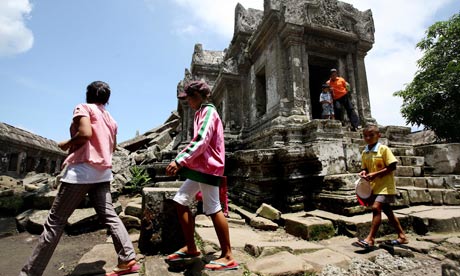Abhisit Vejjajiva attempting to rally nationalist sympathy with Preah Vihear temple dispute before Sunday's polls, say analysts

Tourists at the disputed Preah Vihear temple, perched on a mountaintop on the Thai-Cambodia border.
The corrugated roof gleams, the paintwork is bright and pink-flowered curtains float at the windows. Somrith Sanbradap's house was completed just two days ago, but she shows no sign of pleasure in the achievement.
The Thai farmer's last home went up in flames in February, destroyed by Cambodian shelling as a long dispute over Preah Vihear – the 11th-century temple a few kilometres away – flared up again. At least seven people died and thousands fled homes on both sides of the border. Now residents fear another clash is imminent.
"I lost everything … I don't want this to happen again and the way things are going now, watching the news brings back very bad memories," Somrith said tearfully.
This week, the Thai military said Cambodia was moving in reinforcements – a claim denied by Phnom Penh – after Bangkok announced it was leaving the World Heritage Convention over the dispute.
But analysts believe the row is driven by Sunday's general election inThailand. "In this very critical week for Thai politics, [the temple dispute] has appeared again as a political weapon," said Dr Pavin Chachavalpongpun of the Institute of South-East Asian Studies in Singapore.
He said that while the government's stance would not win over opponents, it had rallied nationalist sympathisers who had drifted away. The incumbent Democrats are trailing Puea Thai in the polls.
The prime minister, Abhisit Vejjajiva, said the decision to leave the convention was solely about defending Thai land, the Nation newspaper reported.
He added: "I want the voters to choose the Democrats as we protect the territory, although it is against the wishes of a leader in a neighbouring country."
Abhisit said the Cambodian leader, Hun Sen, wanted a new Thai government because of his ties to exiled former prime minister Thaksin Shinawatra. The opposition Puea Thai party is headed by Thaksin's sister and regarded as his proxy.
The temple, known as Phra Viharn to Thais, stands high on an escarpment in the Dangrek mountains. Originally a Hindu place of worship it was later used by Buddhists. Bangkok does not dispute a 1962 international court of justice ruling that it belongs to Cambodia, but still claims a 4.6sq km area of land around the site.
In 2008 rightwing Thai nationalists reacted angrily when Unesco granted the site world heritage status, although Bangkok had not opposed Cambodia's application. The Democrats – then in opposition – took an increasingly hawkish line.
While no one expects large scale military action, clashes in the last three years have affected bilateral relations, caused deaths and evacuations and damaged Preah Vihear itself. Prof Charnvit Kasetsiri, a historian and former rector of Bangkok's Thammasat University, warned that the row and the decision to quit the World Heritage Convention were affecting Thailand's standing. "It has damaged our reputation internationally – we look like the bad guys to the world," he said.
The Thai military says it will not instigate hostilities – each side blamed the other for February's skirmish – and now seems to be playing down its comments about Cambodian reinforcements on the other side of the border.
"I'm not scared, because we're well prepared," said a soldier guarding a sandbagged checkpoint at what used to be the ticket booth for the Thai national park leading to the temple. That is as far as one can go – a source of regret to Warunrat Chitruchiphong, a regular visitor since her teenage years. "It's magnificent. I want to go back," she said.
The 34-year-old teacher's bigger concern is the safety of her pupils. The Phumsaron Wittaya high school was in the middle of a sports day when fighting broke out in February; shells hit the buildings as the frightened staff and pupils crouched in concrete bunkers built the previous year.
"I'm constantly worried that if something happens we won't get them into their bunkers in time," said Warunrat. "I'm very nervous, but what can we do?"Pavin said he did not expect to see violence this week or next. But in the longer term, he warned, it depended on the election's outcome."If Puea Thai come back, the issue could be used once again to discredit the red shirts. There's a possibility of the military and Democratic opposition pressing the situation," he said.
No comments:
Post a Comment